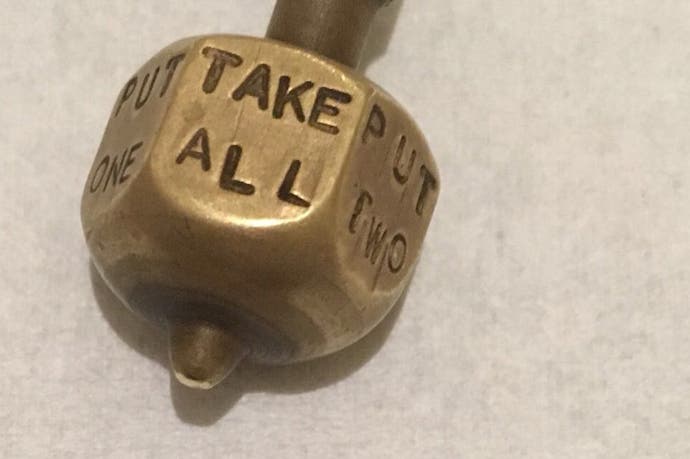Luck and wartime spirit converge in a game made of brass
Put and Take.
The game we played most this Christmas - gathered together with my wife's family in the Cotswolds - was tiny and made of brass. It looked a bit like one of those early World War One grenades - the kind that has a sort of lolly stick that you hold it by before you toss it into the abyss. Fitting, really, because the game we played came from World War One itself, allegedly. The game's called Put and Take, and it's played with an odd six-sided spinner. I had never heard of it before. It's kind of brilliant.
The spinner is known as a teetotum, which is an entirely delightful word. These spinning tops are alternatives to dice, and go as far back as the Greeks and Romans, apparently. Put and Take was born in the trenches, though. That's the most satisfying theory I've read. Someone, perhaps alternating between states of terror, boredom and exhaustion, crouched in one of those dripping underground chambers on the battered front in northern Europe, someone had the idea to take a bullet case and reshape it until it had six sides and could be spun on one end. Then, inevitably, they decided to start gambling with it.
That's the core of Put and Take: gambling. This is part of the Christmas tradition for my wife's family, I gather, and after seven years of marriage I've finally been allowed in. Each person puts in two pounds, but that's just the winner pot. For the game itself you also get thirty wooden toothpicks or cocktail sticks or whatever you want to call them. These are your chips. And then the teetotum comes out.
It is a family artefact, small and fiercely covetable. It feels warm in the hand, a weight at one end and a small corrugated nubbin at the other that you grip between thumb and forefinger before you set it spinning. The six sides of the weighted end have words on them, mysterious words that have been almost entirely rubbed away through use: Take Two, Put One, Take All. What can they mean?

You spin. Everyone has their own way of doing it. My wife's mum is brisk and no-nonsense. My wife's stepdad is something of a showboater, able to keep the top spinning for abnormally long stretches of time. I am positioned at a strange spot at the table, which means the spinner jumps around skittishly, reading the grooves and divots of a half-completed jigsaw that sits beneath the tablecloth. (It is Christmas, after all.) Once the spinner stops, everyone leans in to see which side it has landed on, which words are facing up. And then you simply do what the spinner says. You bow to the instructions of the teetotum.
It is like abandoning yourself to become part of a machine, to respond only to inputs and outputs. Put one: you put one of your toothpicks into the group pot. Put two: you put two of them in. Take one, take two: you claim toothpicks from the pot and your stash goes up. All put: everyone puts a toothpick in. Take all: you have hit the jackpot.
This goes on and on as the spinner is passed around the circle. Everyone leans forward to watch the spinner as it moves. It is a wonderfully charismatic presence, bringing a sense of life to proceedings, juddering, tottering, but sometimes graceful, invoking the harmony of the spheres. It is enough to make everyone forget that Put and Take is actually pretty brainless when you get down to it. There is no skill, no tactical element in play, and no matter how daringly you launch the spinner, you have no control over how it lands.
But yes, we have forgotten all this. And so we coo and gasp as the spinner is launched. We offer opinions. The longer spins are immediately, instinctively associated with better scores, even if this is not born out by reality. The shorter, fumbling spins are seen as failure, even if they land you with Take All and the contents of a really big pot. Quickly, people start to identify certain players with certain outcomes, as if there is some kind of strategy emerging from specific camps, or some kind of moral judgment revealed by the spinner itself. My wife tends to get a lot of Take Alls, as does her stepdad. I tend to put two in quite a lot - so much so that I prepare my two to put before the spinner has stopped moving - and my wife's sister, sat next to me, tends to immediately claim them. We joke that I should just give them to her straight-up.
Put and Take is not a swift game, and this partly comes down to our variety of spinner. Some of them have a Put All side instead of an All Put, and Put All is pretty much a headshot in a game like this. With our spinner, though, we are locked in a game in which you are relatively likely to gain a lot of toothpicks in a single round, but you will at most lose two, which means that when someone starts to slide in their fortunes it takes a very long time for them to actually crash out.
My wife invents some terminology for the game, "to keep things fresh." Getting a Take All just after the pot has been claimed by someone else is an "Empty Nest". A perfect spin - one that seems to be in no danger of actually stopping - is called a Frozen. My wife's stepdad talks about how his own father used to play Put and Take in the Second World War, gambling for Woodbines. He's still showboating - dropping the spinner onto the table from a height, playing it upside down - but he's started to lose toothpicks, and eventually - a long time off - my wife's grandfather will be victorious.
That war thing: this is a game that seems to carry the mark of war on it, and not just because it's made of brass and looks a bit like something you might lob at an enemy. When I think of the big wars of the 20th century, rightly or wrongly I think of terror and violence but also waiting, periods of interminable, stressful, torturous waiting. Waiting to get orders. Waiting for the next bombing run. Waiting to go over the top. War literature - Catch-22, Journey's End - is alive to this, to the two distinct pulse-rates of armed conflict, to the lumpiness of time when you're expected to try and understand that you might die at any moment, and horribly. Why wouldn't you play a game like this at a time like that?
And there is more, I think: Put and Take delights in offering a sort of playful glimpse at the randomness of things. There is no strategy here, no tactical edge you can get. You are at the mercy of fate, and fate is a dawdling kind of thing a lot of the time. This is a game that you can play with anyone as long as they have cigarettes or toothpicks or matches to stump up and time to kill. That's it, really - it is a game for killing time, and a surprisingly great one.


